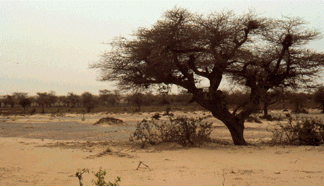 |
|
Desertification near
Kade, Central Ghana. Source: Ghana
News Agency
|
Environmental degradation is the result of the interplay of a number of socio-economic factors and activities. Environmental changes can be driven by many factors including but not limited to economic and population growth, urbanization, intensification of agriculture and the usage of natural resources.
However, poverty still remains the problem at the heart of a number of environmental problems. Environmental degradation and poverty alleviation are urgent issues that need to be addressed by the global community, as a whole, as they are issues which have a lot in common but in development rhetoric are often treated separately.
Poverty is both a cause and an effect of environmental degradation, there is a circular link between the two, as with many international development challenges, and is very complex. Issues surrounding the environment, economics and policies are all inter-related through the way human beings interact both with each other and with their immediate environment. Whilst, environmental problems are expressed in largely generic terms such as climate change, these problems are of particular concern where they are are localised and are immediate issues, which are not viewed remotely by vulnerable or marginalised groups in many developing countries. These affect the poorer sectors of the population as the problems are directly related to household food security.
Poverty and inequality impact on environmental degradation as the poor sectors of the population in many developing countries are far more reliant on natural resources. Reversely, a degraded environmental can accelerate poverty and inequality because the poor are to a larger extent dependent on directly natural resources.
To ensure food security, households often have no choice but to overuse the natural resources available to them, resulting in environmental degradation. This degradation then results in constraints resulting in the vicious cycle of poverty and environmental degradation. That said, it is important to remind ourselves that the world's poor are both agents and victims, and that there is no inherent inclination to degrade the environment.
 |
| Impact of Climate Change on the landscape resulting in desertification Source: Scientific American |
Whilst, this takes the problem down to its most simplified level, acceleration in poverty alleviation is no doubt imperative to break the link, as is more considered environmental policy and action at all levels: local, regional, national and international. However, it is also important to address the ongoing concern and belief that for less economically developed countries to continue to development that they may need to sacrifice environmental concerns or that it is a luxury to address when higher standards of living are achieved. This stems from the belief that the world's increasing population and the resultant excessive burden on the world's natural resources is the current systemic root course of environmental degradation.
It is important that lessons are learnt from the environmental damaging processes of the world's longest industrialised nations; these lessons must be learnt and applied. Sustainability is the key for a better balanced relationship between development and the environment. However, the overloaded and overused phrase sustainable development must be used by practioners to recognise the interconnectedness between human beings and the environment if true progress is to be made.
There has in recent years, been somewhat of a shift in this rhetoric, with developing countries becoming more engaged in environmental issues, in particular Africa, as it is one of continents more directly experiencing the effects of climate change. The engagement of developing countries is important in ensuring the shift from this rather antiquated notion to one that actively pursues the need to tailor the velocity and blueprint of global economic growth to Earth's carrying capacity. This has to happen now to ensure that we make development sustainable and that "we can meet the needs of the present without compromising the ability of future generations to meet their own needs." (Our Common
Future, also known as the Brundtland
Report, from the United Nations World Commission on Environment and Development
(WCED) was published in 1987.)
As environmental degradation has continued to worsen and in doing so has exacerbated poverty and food security, there has been a conscience development in the importance placed on environmental conservation. However, more needs to be done in terms of transformative new strategies to combine policies and practices in the areas of poverty alleviation and environmental conservation.
 |
| Melting ice in the Artic, an area most at risk from the impact of Climate Change Source: Guardian |
There needs to be a greater appreciation in development policy by national governments and international communities for integrated poverty and environmental programs, particularly in marginalised areas, to allow for a concerted effort to promote a new perception and relationship for those living in poverty with their immediate environment.
It is imperative that we remember that climate change and environmental degradation affects everyone on the planet, but to differing degrees depending on their level of economic development and consumption patterns, including their use of fossil fuels and their relationship to their immediate environment.
While this is a somewhat oversimplified view that just scratches the surface, the main principle is that we need to understand these issues more. The interconnectedness talked about above needs to have greater recognition if the environmental degradation and poverty nexus is to be sufficiently addressed through specific long-term strategies. We must analyse all parts of the whole, and in some cases, turn to the populations in marginalised areas, where people through necessity have found creative and innovative solutions to cope with their environment.



No comments:
Post a Comment